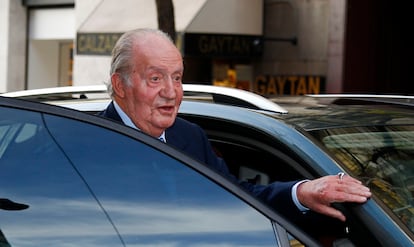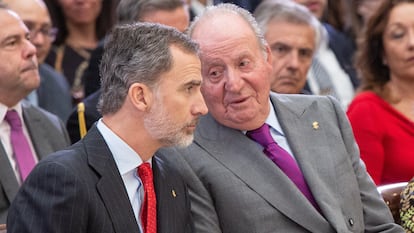Spanish prosecutors prepare to shelve investigations into emeritus king Juan Carlos I
This decision will mean no lawsuits will be filed against the monarch, who has been living in Abu Dhabi since August 2020

The Supreme Court public prosecutor and the anti-corruption prosecutor are preparing a “broad document” setting out the reasons behind their upcoming decision to shelve all three ongoing investigations into Spain’s former king, Juan Carlos I. That’s according to sources with knowledge of the investigation, who have spoken to EL PAÍS.
The decree that will officially bring an end to the legal proceedings, and will mean no lawsuits will be filed against the monarch, will be made public in the coming weeks, as was first reported by online Spanish daily El Confidencial.
The two prosecutors’ offices have been working for more than two years to investigate allegations of tax fraud and other offenses involving international businesses that have been leveled against Juan Carlos I, who abdicated the throne in 2014.
One line of investigation was the existence of funds in tax havens that allegedly belonged to the father of the current king, Felipe VI. Another was the possible payment of kickbacks for his role in securing a contract from Saudi Arabia that was awarded to a Spanish consortium of countries to build a high-speed AVE train link to Mecca. There has also been a probe into his alleged use of funds from a Mexican businessman, a friend of Juan Carlos’s, via a frontman.
The public prosecutor has reached the conclusion that some of the crimes being investigated – funds hidden in tax havens more than three decades ago – have clearly exceeded the statute of limitations for such offenses. Others cannot be prosecuted given that, even if they can be proven to have taken place, they dated from before 2014, when Juan Carlos enjoyed immunity thanks to his status as reigning monarch.
The alleged offenses relating to the use of other people’s money, meanwhile, without such activity being declared to the Spanish Tax Agency, can also not be pursued by the courts given that the emeritus king filed two regularizations in December 2020 and February 2021, thus deactivating any possibility of legal action.

The investigation by the public prosecutor is of the view that these regularizations were properly executed and therefore it believes it cannot act. There had until now been doubts about where the process was legal, given that they were filed after the emeritus king found out from his attorney that investigations had begun into his role in the AVE contract as well as the donation from the Mexican businessman.
Tax experts have argued that the mere notification on the part of the prosecutor about the investigation should impede a regularization of Juan Carlos’s tax affairs. Other lawyers argue that if the notification is generic and does not detail the true motive of the investigation, the regularization is permitted.
Given the mounting allegations against him and succession of scandals, Juan Carlos I left Spain in August 2020, and has been living in Abu Dhabi since. The sources with knowledge of the legal probe consulted by EL PAÍS opted not to comment on his possible return to Spain.
The emeritus king was once a revered figure in Spain due to his role in the so-called Transition, when the country returned to democracy after the dictatorship of General Francisco Franco. However, his problems began in 2012, when he suffered an accident on a hunting trip in Botswana. As a result of this incident, his relationship with a German businesswoman, Corinna Larsen, came to light. The incident damaged the monarch’s reputation and was partially behind his surprise decision to abdicate in 2014.
In later years the accusations of financial impropriety and legal problems began to mount up. As a result, on March 15, 2020, King Felipe VI announced that he would renounce any future inheritance from his father that was connected with his foreign bank accounts. He also stripped Juan Carlos of his annual stipend of €194,232.
Tu suscripción se está usando en otro dispositivo
¿Quieres añadir otro usuario a tu suscripción?
Si continúas leyendo en este dispositivo, no se podrá leer en el otro.
FlechaTu suscripción se está usando en otro dispositivo y solo puedes acceder a EL PAÍS desde un dispositivo a la vez.
Si quieres compartir tu cuenta, cambia tu suscripción a la modalidad Premium, así podrás añadir otro usuario. Cada uno accederá con su propia cuenta de email, lo que os permitirá personalizar vuestra experiencia en EL PAÍS.
¿Tienes una suscripción de empresa? Accede aquí para contratar más cuentas.
En el caso de no saber quién está usando tu cuenta, te recomendamos cambiar tu contraseña aquí.
Si decides continuar compartiendo tu cuenta, este mensaje se mostrará en tu dispositivo y en el de la otra persona que está usando tu cuenta de forma indefinida, afectando a tu experiencia de lectura. Puedes consultar aquí los términos y condiciones de la suscripción digital.








































